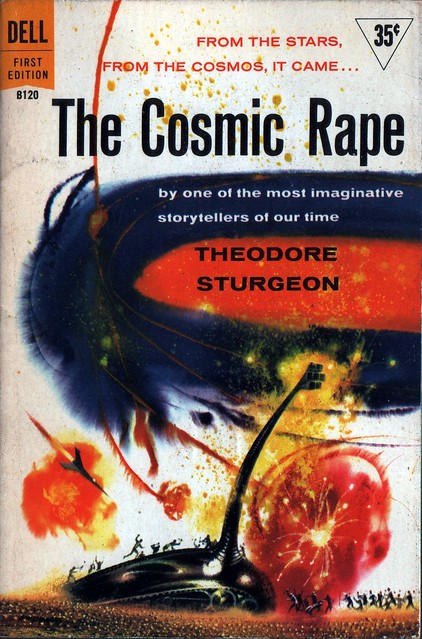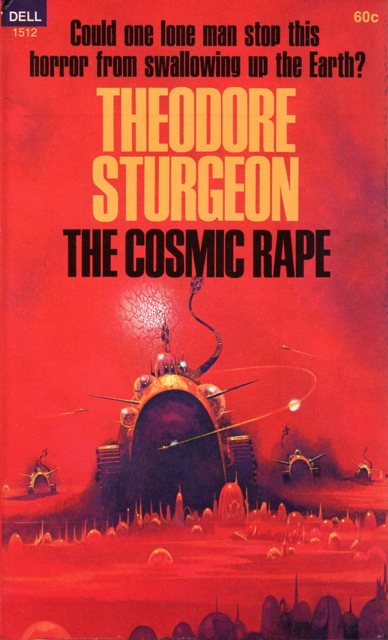Tags
1950s, 1958, Dell, evolutionary transcendence, first contact, Galaxy Science Fiction, invasion!, Paul Lehr, Richard Powers, science fiction, Theodore Sturgeon, transhumanism
So it was, chuckling, that Daniel Gurlick went forth from his wrecked truck to conquer the world.
Dan Gurlick is far from the prime specimen of homo sapiens—he’s not even an average specimen, a semi-literate and homeless drunk who spends his life daydreaming about a promiscuous skinny-dipping woman, when he’s not picking through garbage for half-eaten hamburgers. But one of those hamburger remains happened to contain the spore from a dominant alien mind called Medusa that melds its intelligence to Dan. It is through him that Medusa will begin its conquest of humanity, yet another species to absorb and encompass. Much to Medusa’s confusion, humans are not like the other species it has contacted—rather than a hive-mind, humans have individual consciousnesses, stalling its invasion plans. In order to conquer humanity, Medusa sets out to join all human consciousness first, to restore that missing hive-mind…
The chapters with Dan and Medusa alternate with slice-of-life cuts from across the globe, most of them dealing with characters who are often unsavory, sometimes pitiful, and always distinctive. There’s the accounting clerk who date-rapes a coworker, the Italian juvenile delinquent hiding in the attic of a detective he plans to kill, the cowardly boy too afraid to be at school, and the harried family moving cross-country who stop for a picnic. As Medusa works her magic and attempts to combine and enslave the human race, these threads come together to form a human tapestry. Reading through this series of vignettes is odd at first, as it breaks up the flow of the Dan/Medusa arc. But they add a human touch, highlighting the spectrum of humanity as Medusa attempts to “unite” it.
Sturgeon was one of the best writers of the 1950s, and his works hold up well given the passage of time. His prose is jazzy and electric, but not overwritten in any way. The plot is somber, meditative, and intensely introspective, but not absent of action or drama. Many of the novel’s elements foreshadow the New Wave, like its literary flair, or how the plot jumps across a sprawling cast, or the sheer number of disagreeable characters that are included. Its ideas and concepts are fresh and evocative, and it ends on a mind-boggling climax that should wow your socks off. Think Clarke-style grandiose ideas, but darker and more distributing. And how often can you point to an alien invasion novel that offers such commentary—good and bad—of the human experience? Despite its unfortunate name, this is a solid novel of brilliant quality.
The Cosmic Rape is a darkly intelligent masterpiece, just as thought-provoking now as it was over sixty years ago. Not only does it offer an interesting take on the alien invasion story, it brings up some surprising ideas about the human consciousness and ends on an odd but touching note. It’s a lightning-fast read at just 160 pages—the Kindle copy gave a helpful estimated average reading time of a little over two hours—but the novel’s ideas are something you’ll ponder long after you’ve finished. Sturgeon combines an engaging plot with striking ideas, and the result is a bold and imaginative novel. This is a must for any fan of 1950s SF, though really, anything written by Sturgeon is worth seeking out.
Book Details
Title: The Cosmic Rape
Variant Title: To Marry Medusa (Galaxy serialization)
Author: Theodore Sturgeon
First Published: Aug 1958
What I Read: Open Road Media ebook
Price I Paid: $2 (#ebookdeal)
MSRP: $15 pb / $7.99 ebook
ISBN/ASIN: 0375703721 / B00CADHJKE



I’m surprised I haven’t read this one — back in the day I read as much Sturgeon as I could lay hands on. As you say, he was way ahead of his time, unafraid to tackle themes that most other sf authors of his era fled from.
LikeLiked by 1 person
You should give it a read if you get a chance, it’s a meaty book for such a slim volume.
What is (or are!) your favorite Ted Surgeon works? I very much liked this one, but I have a soft spot for Venus Plus X…
LikeLike
If you haven’t, you need to read the COLLECTED STORIES. And TO MARRY MEDUSA in the Tor edition under that title is worth having. Ever tried Kate Wilhelm and Theodore Thomas’s THE CLONE if you love the blend of sf and horror Sturgeon would offer at times?
LikeLiked by 1 person
Have not read THE CLONE but I really enjoyed the Kate Wilhelm novels I’ve read, so adding it to the list. Thanks!
LikeLike
Another fine review, Chris. I’m gonna have to make a special TBR list based solely on your reviews! Regarding Sturgeon, I’ve only read More Than Human so far. Think I need to reread it to fully appreciate it.
LikeLiked by 1 person
🙂 Thanks Gray! MORE THAN HUMAN is a good first choice, if you enjoyed it then I’d definitely recommend trying VENUS PLUS X or THE COSMIC RAPE.
LikeLike
Hi
A good choice, I read this many years ago up I should take another look. I remember it as being very dark and disturbing as you said. I think it would be interesting to look at it relation to the many more horror tinged SF works we see now. I think Sturgeon was quite ahead of his time in that aspect of the novel. I do remember it made an imprssion
Guy
LikeLiked by 1 person
Very much ahead of his time, just a superb writer. I’ve been meaning to read or re-read all of Sturgeon’s novels, so I decided to start with this one. Thanks Guy!
LikeLike
I echo what Guy said (as I read this years ago) — I enjoyed the really dark undercurrents of the novel, and found it compelling (although perhaps not a “masterpiece” haha!
And, it certainly received some brilliant covers which convey how moody and powerful it is….
LikeLiked by 1 person
I’m a big Sturgeon fan and devoured the multi volume short story collection and even one of his westerns.
LikeLiked by 1 person
I love those covers—very dark and moody indeed. I own the Powers one I posted, but it’s in a box somewhere so I read the e-copy instead 😦
LikeLiked by 1 person